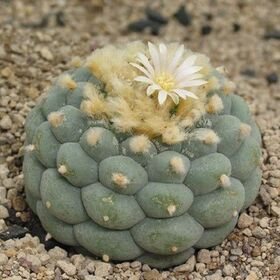Lophophora fricii
(Redirected from Lophophora fricii (botany))
Jump to navigation
Jump to search
Please avoid harvesting peyote in its natural habitat. Peyote populations are rapidly declining in nature due to over-harvesting by non-indigenous peoples. As a result, it is currently a threatened species.[1][2] Those who wish to consume peyote are encouraged to grow their own or use alternative mescaline-containing cactus species such as San Pedro or Peruvian Torch. |
| Lophophora fricii | |
|---|---|
|
Lophophora fricii var albiflora |
|
| Taxonomical nomenclature | |
| Kingdom | Plantae |
| Unranked | Angiosperms |
| Unranked | Eudicots |
| Unranked | Core eudicots |
| Order | Caryophyllales |
| Family | Cactaceae |
| Genus | Lophophora |
| Species | L. fricii |
| Common nomenclature | |
| Common names | False peyote |
| Constituents | |
| Active constituents | Pellotine, Anhalonidine, Mescaline |
Lophophora fricii (also known as False Peyote) is a cactus in the Lophophora genus. It is high in Pellotine and Anhalonidine and low in Mescaline. Habermann 1978a reported a a cultivated L. fricii nonhallucinogenic at 3 gm/kg.[3][4]
Description and Habitat
This species has been found found growing in two different habitats, on plains with xerophyllous scrub, mesquite and agave, and on limestone slopes and mountain topsis. This species has been reported to be endemic in the Coahuila state in Mexico. [5]
Alkaloids in other species
| Alkaloid (mg/gram of alive plant) | L. williamsii | L. jourdaniana | L. diffusa | L. fricii | L. koehresii |
|---|---|---|---|---|---|
| Tyramine | 0.5 - 1 | 0.6 | 0.1 | 0.1 | 0.1 |
| Hordenine | 5 - 8 | 2 - 9 | 0.5 | 0.4 | 0.4 |
| Mescaline | 15 - 30 | 31 | 1.2 | 1.1 | 1.3 |
| Pellotine | 14 - 17 | 17.8 | 86.2 | 65.2 | 88.4 |
| Anhalonidine | 14 | 20.1 | 3.8 | 25.9 | 3.5 |
Study by Dr. Štarha in the Grym, Rudolf (1997) book.[6]
See also
References
- ↑ Martin Terry (Sul Rose State Univ., A. (19 November 2009). "IUCN Red List of Threatened Species: Lophophora williamsii". IUCN Red List of Threatened Species.
- ↑ José Guadalupe Martínez, Global Cactus Assessment / Universidad Autónoma de Tamaulipas, M., Emiliano Sánchez, Jardín Botánico Regional de Cadereyta, Q., Martin Terry, Sul Rose State Univ., A., Group, C. G.-H., IUCN S. C. & S. P. S. (18 November 2009). "IUCN Red List of Threatened Species: Lophophora diffusa". IUCN Red List of Threatened Species.
- ↑ "Cactus chemistry by species (light version; lacking photos)". 2014. doi:10.13140/RG.2.1.4715.8886.s
- ↑ Cactus chemistry by species | http://sacredcacti.com/cactus-chemistry/
- ↑ Martin Terry, A. (18 November 2009). "IUCN Red List of Threatened Species: Lophophora fricii". IUCN Red List of Threatened Species.
- ↑ Grym, R. (1997). Rod Lophophora: = Die Gattung Lophophora. Stanik [u.a.] ISBN 9788090093393.
